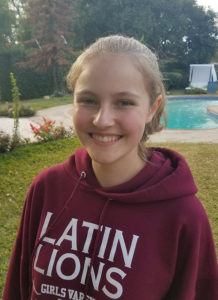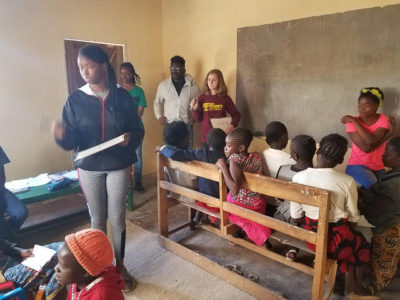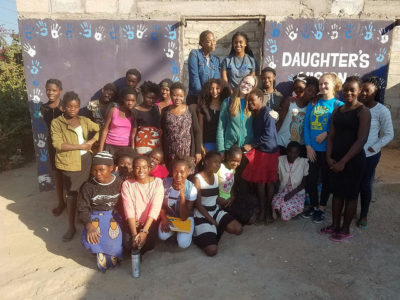 Tuesday, July 3 – Teaching is much easier said than done. Today we taught our last day at Daughter’s Vision, and it was a very difficult but very rewarding experience. Going into this trip and knowing we would spend a lot of our time teaching, I did not expect teaching to be exhausting at all and did not think of it as very difficult work. However, I was quite wrong.
Tuesday, July 3 – Teaching is much easier said than done. Today we taught our last day at Daughter’s Vision, and it was a very difficult but very rewarding experience. Going into this trip and knowing we would spend a lot of our time teaching, I did not expect teaching to be exhausting at all and did not think of it as very difficult work. However, I was quite wrong.
I spent my time at Daughter’s Vision teaching math with Celine and Chinonso, to four classes of different ages, for three hours a day. The majority of the first two classes did not know even the basics such as their letters or numbers, so we spent the second and third day teaching them how to write numbers. We split the first two classes into two groups which seemed to work really well because Celine and I worked with the less advanced group and we could work one-on-one with students.
However, even teaching like this, it was difficult. Many students had not developed their fine motor skills yet, so we had to make worksheets for them with large, dashed numbers written on them that students could trace over. Many students had trouble with writing numbers backwards, so we held and guided their hand as they went over the dashed numbers. Even after ten minutes of this, one student would still occasionally write numbers backwards, which was kind of eye-opening. Although students do this in the US as well, we couldn’t help wonder if maybe some of the children had learning disabilities which we also realized was not something that would necessarily be diagnosed or addressed. Also, when other people on the trip shared stories of students having trouble responding, Gaby made the point that some of the malnutrition that these children are experiencing may be affecting their brain development. Even if students were slow to understand what we were trying to teach, though, they were always very eager to learn.
 Despite some of these challenges, we found that some of our students were very smart, and could understand concepts quickly. They would always be so excited to share the answer to a problem once they had it. For example, when we played games with the second two classes, girls would answer the question out of turn, before their teammate could solve it. We kept reminding them to wait for their classmates to work through the problem, and although it was a little frustrating, I think it showed how excited they were to be learning. Even when we were upset at them for shouting the answer, they would smile because they knew they got the question correct. Realizing that some of these students who are clearly intelligent do not have access to a better education was certainly upsetting for many of us. Danyelle, in particular, seemed really upset and frustrated that these students would not be getting the same attention once we left and was brainstorming how we might address this issue from the U.S.
Despite some of these challenges, we found that some of our students were very smart, and could understand concepts quickly. They would always be so excited to share the answer to a problem once they had it. For example, when we played games with the second two classes, girls would answer the question out of turn, before their teammate could solve it. We kept reminding them to wait for their classmates to work through the problem, and although it was a little frustrating, I think it showed how excited they were to be learning. Even when we were upset at them for shouting the answer, they would smile because they knew they got the question correct. Realizing that some of these students who are clearly intelligent do not have access to a better education was certainly upsetting for many of us. Danyelle, in particular, seemed really upset and frustrated that these students would not be getting the same attention once we left and was brainstorming how we might address this issue from the U.S.
One student in the last class, Patricia, was able to pick up on the concepts we were teaching before the rest of the students. The first day she walked into the math class and when we said we would work on multiplication, her face lit up. When we taught them rules/tricks to multiply numbers by 9, 10, or 11, she would be able to get them before others, and helped explain them to others who did not understand yet.
 It was really rewarding to see a student understand something that you had been teaching for a while. For example, two girls in the second class did not know how to write any numbers, and could only read some. By the end of the class, they were able to read and write all of the numbers 1 through 10. I felt really proud of them, especially because they were struggling at the start of class and seemed overwhelmed. It was difficult, and took a lot of patience, but it made me really happy to see that I had taught someone a useful skill that they could continue to use once I left.
It was really rewarding to see a student understand something that you had been teaching for a while. For example, two girls in the second class did not know how to write any numbers, and could only read some. By the end of the class, they were able to read and write all of the numbers 1 through 10. I felt really proud of them, especially because they were struggling at the start of class and seemed overwhelmed. It was difficult, and took a lot of patience, but it made me really happy to see that I had taught someone a useful skill that they could continue to use once I left.
All of the girls on our trip also led a health and sex education class later in the day with the older girls from Daughter’s Vision. Many of them did not quite understand what HIV was and how you get it, or were too shy to answer. They had some basic knowledge about female biology, safe sex, and healthy relationships, but definitely had the least knowledge out of all the sex ed classes that we’ve taught so far on the trip. We ended up having a good conversation about healthy relationships with them. They had questions about when to leave a partner, how dependent you should be on other people, and gender roles, which led to good advice being shared by us and by them. I think the girls got some good takeaways from the conversation, and have more knowledge on how to protect themselves well from STDs.
All of the people at Daughter’s Vision were really welcoming to us, and us being here is the only time they have multiple teachers and subjects a day, so they were very eager to learn as much as possible. This also made teaching them feel very high-stakes, but I think we did well, and we are as grateful to them as they are to us. Today we taught our last day at Daughter’s Vision, and as hard as these three days have been, teaching four classes a day and as many skills as we could, I’m really going to miss being at Daughter’s Vision and seeing Gladys and all of the girls.
Perrin B., Washington Latin Public Charter School
